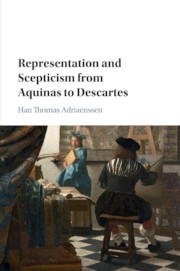PART III - REPRESENTATIONS AND SCEPTICISM
Published online by Cambridge University Press: 13 July 2017
Summary
We have seen that, like the medieval critics of species, those who engaged the problems surrounding ideas often looked to direct realism for solutions. Echoing the terminology of scholastic psychology, in fact, Cartesians such as Arnauld and Desgabets described ideas as means rather than objects of direct perception. Also, to deal with the problems surrounding ideas, early modern philosophers often drew inspiration from more specific medieval notions and concepts, which they believed would help them anchor knowledge of external objects.
But were the problems that these early moderns saw for ideas the same as those that the medieval critics of species saw for species? Some scholars have ventured comparative remarks here, suggesting that the later critics of ideas may well have seen the same problems for ideas as the medievals saw for species. Nevertheless, no systematic comparison of the critical receptions of species and ideas has so far been undertaken. On the basis of the first two parts of this book, however, we should now be in a better position to say something more about the extent and nature of the similarities and differences between the medieval attacks on species and the later criticism of representation and cognitive mediation.
To facilitate comparative discussion, it will be useful to briefly remind ourselves of the basic kind of account that we have seen the critics of species and ideas target. This account typically comprises two basic claims. The first of these says that cognition involves devices that resist reduction to cognitive acts, and which represent external objects to us: these devices represent external objects, causing us to envision, or to think of them. And the second is that some of these devices will likely represent their objects correctly, while others will be misrepresentations. Those that represent their objects correctly are potential sources of knowledge. But those that misrepresent their objects will make us think of objects otherwise than they are, and may lead us into error.
Many philosophers have raised substantial problems for this account. These problems have appeared in diverse contexts and have received different formulations. But for the most part, they have tended to fall into two basic categories, each focusing on one of the two claims above.
- Type
- Chapter
- Information
- Representation and Scepticism from Aquinas to Descartes , pp. 221 - 222Publisher: Cambridge University PressPrint publication year: 2017



